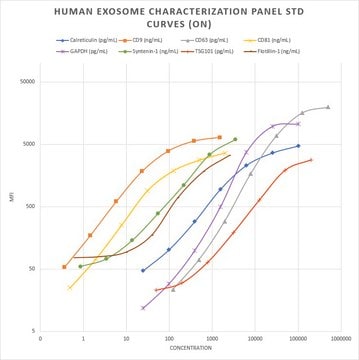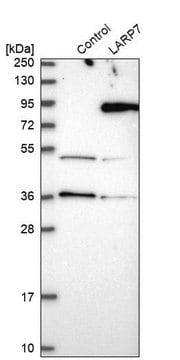推薦產品
生物源
rabbit
共軛
unconjugated
抗體表格
affinity isolated antibody
抗體產品種類
primary antibodies
無性繁殖
polyclonal
產品線
Prestige Antibodies® Powered by Atlas Antibodies
形狀
buffered aqueous glycerol solution
物種活性
human
技術
immunoblotting: 0.04-0.4 μg/mL
immunofluorescence: 0.25-2 μg/mL
immunohistochemistry: 1:500-1:1000
免疫原序列
AKSDDTSDDDFMEEGGEEDGGSDGMGGDGSEFLQRDFSETYERYHTESLQNMSKQELIKEYLELEKCLSRMEDENNRLRLESKRLGGDDARVRELELELDRLRAENLQLLTENELHRQQERA
UniProt登錄號
運輸包裝
wet ice
儲存溫度
−20°C
目標翻譯後修改
unmodified
基因資訊
human ... HEXIM1(10614)
一般說明
HEXIM1 (hexamethylene bis-acetamide inducible 1) functions as a homdimer and was first recognized in hexamethylene bisacetamide (HMBA) treated vascular smooth muscle cells. It is primarily known as the inhibitor of positive transcription elongation factor b (P-TEFb). This gene is localized to human chromosome 17q21.31.
免疫原
hexamethylene bis-acetamide inducible 1 recombinant protein epitope signature tag (PrEST)
應用
All Prestige Antibodies Powered by Atlas Antibodies are developed and validated by the Human Protein Atlas (HPA) project and as a result, are supported by the most extensive characterization in the industry.
The Human Protein Atlas project can be subdivided into three efforts: Human Tissue Atlas, Cancer Atlas, and Human Cell Atlas. The antibodies that have been generated in support of the Tissue and Cancer Atlas projects have been tested by immunohistochemistry against hundreds of normal and disease tissues and through the recent efforts of the Human Cell Atlas project, many have been characterized by immunofluorescence to map the human proteome not only at the tissue level but now at the subcellular level. These images and the collection of this vast data set can be viewed on the Human Protein Atlas (HPA) site by clicking on the Image Gallery link. We also provide Prestige Antibodies® protocols and other useful information.
The Human Protein Atlas project can be subdivided into three efforts: Human Tissue Atlas, Cancer Atlas, and Human Cell Atlas. The antibodies that have been generated in support of the Tissue and Cancer Atlas projects have been tested by immunohistochemistry against hundreds of normal and disease tissues and through the recent efforts of the Human Cell Atlas project, many have been characterized by immunofluorescence to map the human proteome not only at the tissue level but now at the subcellular level. These images and the collection of this vast data set can be viewed on the Human Protein Atlas (HPA) site by clicking on the Image Gallery link. We also provide Prestige Antibodies® protocols and other useful information.
生化/生理作用
HEXIM1 (hexamethylene bis-acetamide inducible 1) is a tight regulator of the activity of positive transcription elongation factor b (P-TEFb). This protein interacts with the small P-TEFb complex, which then facilitates the formation of the large, inactive P-TEFb complex. Its interaction with P-TEFb is also responsible for the induction of differentiation of human pluripotent stem cells. Through regulation of P-TEFb, HEXIM1 controls the expression of cyclin D1 in mammary epithelial cells in a 17β-estradiol/estrogen receptor-α-dependent manner. Hexamethylene bisacetamide (HMBA) functions as an antagonist of HEXIM1 and leads to its dissociation from P-TEFb, thus promoting the transcription of HIV (human immunodeficiency virus).
特點和優勢
Prestige Antibodies® are highly characterized and extensively validated antibodies with the added benefit of all available characterization data for each target being accessible via the Human Protein Atlas portal linked just below the product name at the top of this page. The uniqueness and low cross-reactivity of the Prestige Antibodies® to other proteins are due to a thorough selection of antigen regions, affinity purification, and stringent selection. Prestige antigen controls are available for every corresponding Prestige Antibody and can be found in the linkage section.
Every Prestige Antibody is tested in the following ways:
Every Prestige Antibody is tested in the following ways:
- IHC tissue array of 44 normal human tissues and 20 of the most common cancer type tissues.
- Protein array of 364 human recombinant protein fragments.
聯結
Corresponding Antigen APREST71012
外觀
Solution in phosphate-buffered saline, pH 7.2, containing 40% glycerol and 0.02% sodium azide
法律資訊
Prestige Antibodies is a registered trademark of Merck KGaA, Darmstadt, Germany
免責聲明
Unless otherwise stated in our catalog or other company documentation accompanying the product(s), our products are intended for research use only and are not to be used for any other purpose, which includes but is not limited to, unauthorized commercial uses, in vitro diagnostic uses, ex vivo or in vivo therapeutic uses or any type of consumption or application to humans or animals.
未找到適合的產品?
試用我們的產品選擇工具.
儲存類別代碼
10 - Combustible liquids
水污染物質分類(WGK)
WGK 1
閃點(°F)
Not applicable
閃點(°C)
Not applicable
個人防護裝備
Eyeshields, Gloves, multi-purpose combination respirator cartridge (US)
分析證明 (COA)
輸入產品批次/批號來搜索 分析證明 (COA)。在產品’s標籤上找到批次和批號,寫有 ‘Lot’或‘Batch’.。
Ndiya Ogba et al.
Cancer research, 68(17), 7015-7024 (2008-09-02)
Estrogen receptor alpha (ERalpha) plays a key role in mammary gland development and is implicated in breast cancer through the transcriptional regulation of genes linked to proliferation and apoptosis. We previously reported that hexamethylene bisacetamide inducible protein 1 (HEXIM1) inhibits
Jennifer Permuth-Wey et al.
Nature communications, 4, 1627-1627 (2013-03-29)
Epithelial ovarian cancer (EOC) has a heritable component that remains to be fully characterized. Most identified common susceptibility variants lie in non-protein-coding sequences. We hypothesized that variants in the 3' untranslated region at putative microRNA (miRNA)-binding sites represent functional targets
Vanessa Ding et al.
PloS one, 8(8), e72823-e72823 (2013-08-27)
Hexamethylene bisacetamide inducible protein 1 (HEXIM1) is best known as the inhibitor of positive transcription elongation factor b (P-TEFb), which is composed of cyclin-dependent kinase 9 (CDK9)/cyclin T1. P-TEFb is an essential regulator for the transcriptional elongation by RNA polymerase
Xavier Contreras et al.
PLoS pathogens, 3(10), 1459-1469 (2007-10-17)
Hexamethylene bisacetamide (HMBA) is a potent inducer of cell differentiation and HIV production in chronically infected cells. However, its mechanism of action remains poorly defined. In this study, we demonstrate that HMBA activates transiently the PI3K/Akt pathway, which leads to
我們的科學家團隊在所有研究領域都有豐富的經驗,包括生命科學、材料科學、化學合成、色譜、分析等.
聯絡技術服務






